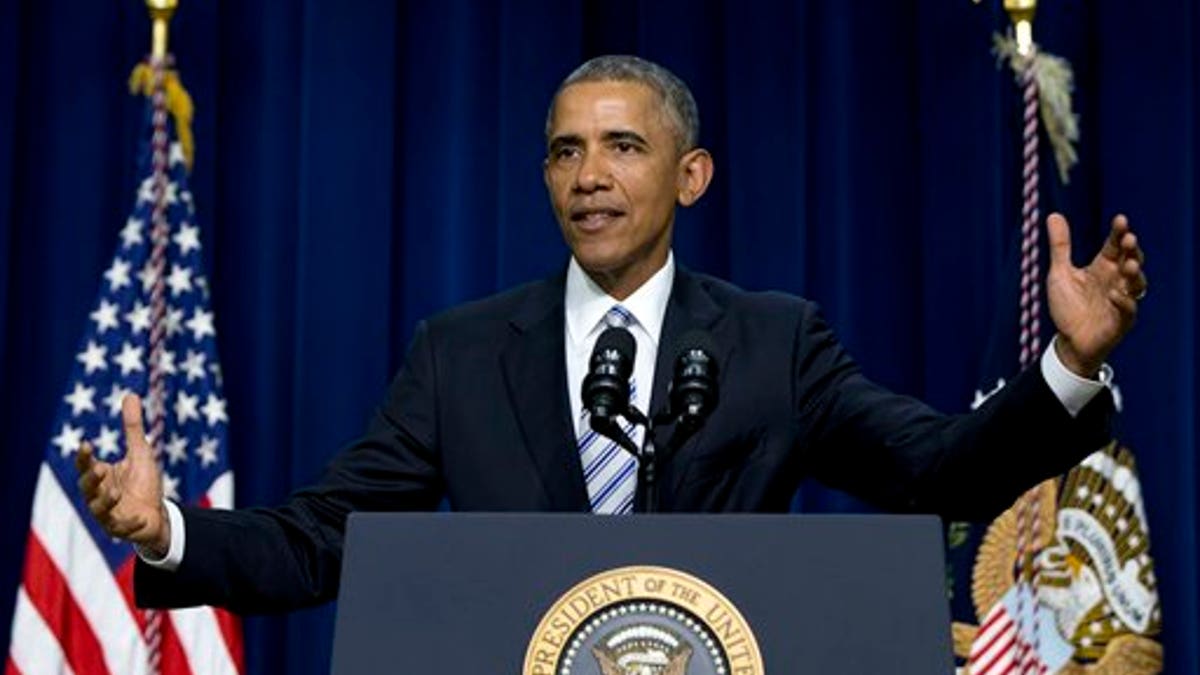
President Barack Obama speaks in the Eisenhower Executive Office Building in the White House Complex in Washington, Wednesday, Feb. 18, 2015. (AP Photo/Carolyn Kaster)
February is Black History Month, a time to remember that, when we talk about the “land of the free, and the home of the brave,” the men and women who have helped make us that way did not all have the same skin color as George Washington and Abraham Lincoln.
It is a time to remember that when Grant faced Lee at Richmond, 1 out of 8 Union soldiers was an African-American.
It is a time to remember the creative genius of George Washington Carver, the powerful eloquence of Langston Hughes, and the courageous stubbornness of Jackie Robinson. It is a time to remember that the places in the pantheon of liberty’s story include the Edmund Pettis Bridge.
But while this month is a time to celebrate the contributions of millions of African-Americans to the story of our great nation, it is also an appropriate time to consider the challenges that remain for our African-American communities -- and the irony that those challenges have been exacerbated by the failings of our first African-American president.
The president who promised to bring us together has embraced policies and personalities that pull us apart, with predictable results.
Unemployment among blacks rose 42 percent in Obama’s first five years as president – worse than unemployment for whites and Hispanics and far worse than the 20 percent decrease in unemployment among black adults during Ronald Reagan’s presidency. Other statistics tell a similar story: inflation-adjusted gross income is down for African-Americans, while slightly up for whites and Hispanics, and many African-American children remain trapped in failing schools and violent neighborhoods.
The president who promised to bring us together has embraced policies and personalities that pull us apart, with predictable results.
In a larger sense, the Obama record under review during this Black History Month is even worse than the statistics show, for a simple reason: The president who promised to bring us together has embraced policies and personalities that pull us apart, with predictable results.
Let’s start by considering Obama’s outgoing Attorney General, Eric Holder. He said America is filled with racial “cowards,” compared laws aimed at reducing voter fraud to Jim Crow laws, and likened the death of Michael Brown in Ferguson, Mo., to the death of Emmett Till.
Although all of this rhetoric is hyperbolic and unhelpful, Holder’s comments about Ferguson are especially egregious, because his Justice Department later decided not to file civil rights charges against the police officer who shot Brown. In other words, Holder concluded that the officer did not violate Brown’s civil rights. Why, then, did Holder compare Brown’s tragic death to that of Emmett Till, a 14-year-old African-American who was lynched in 1955 for whistling at a white woman?
Another divisive lieutenant Obama has embraced is Rev. Al Sharpton, the president’s go-to-man on police-community relations. Sharpton is a demagogue of the highest order who has been wrong on almost every community concern since the Tawana Brawley case. In particular, he has opposed the very policing reforms that rescued New York City from murder rates that, in 1990, reached 2,605 victims per year. Today, New York City has a mere fraction of the murder rate of Obama’s Chicago – where gun control has been at the forefront of its failed attempts at crime control. Yet Sharpton and Holder have waged a crusade against the police reforms that – unlike gun control – reduce crime and save lives.
If their crusade succeeds, President Obama will be as bad for the national crime rate as he has been for the national unemployment rate – which appears to be slowly improving, no thanks to the president. Meanwhile, the one thing we can rely on, especially as the next election nears, is that President Obama will continue to try to divide us.
Obama’s allies will try to win the next presidential election the way they won the last one. They’ll talk about a nonexistent “war on women” to divide women from men. They’ll call people names like, to quote Holder, “cowards” and treat political opponents like, to quote Obama, “enemies.” And they’ll ignore one of the most important lessons of Black History Month: True progress for African-Americans (and all Americans) depends far more on the courage and good sense of African-Americans outside the corridors of power (and that of all Americans outside those corridors) than on the policy prescriptions of misguided liberals in Washington, D.C.
Niger Innis is a civil rights leader and Executive Director of TheTeaParty.net.








































